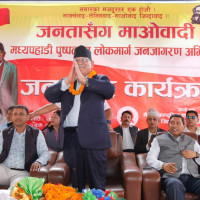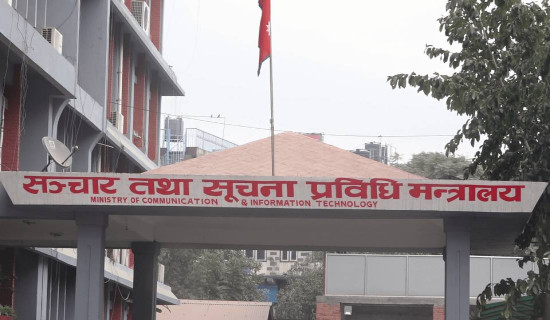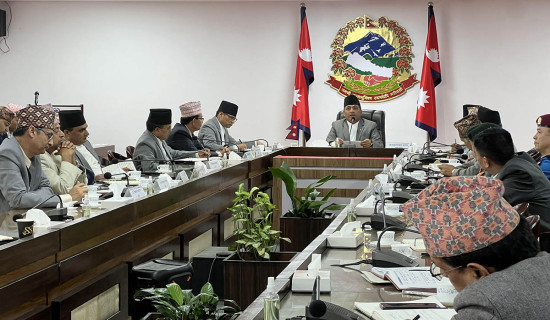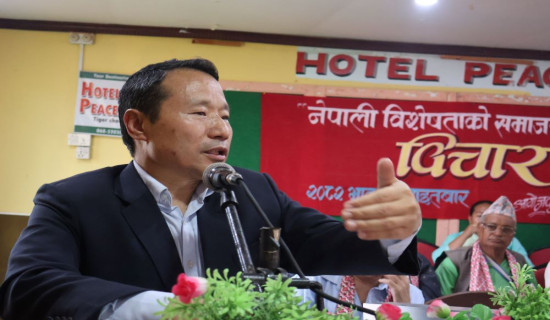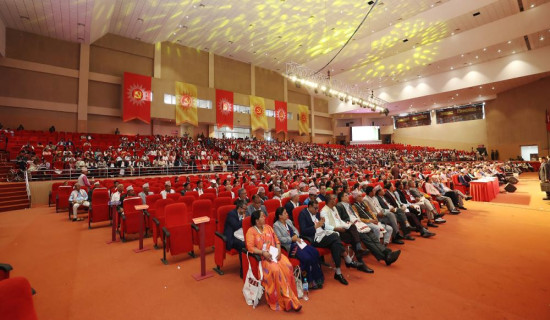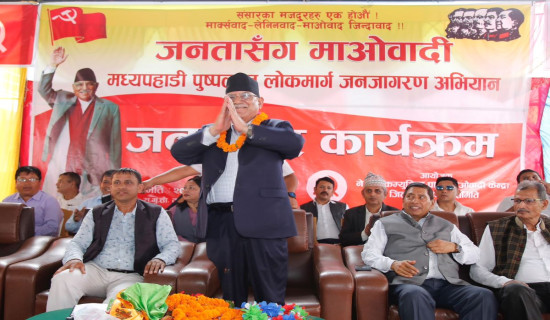- Monday, 8 September 2025
Land erosion and degradation resulting in severe problems to livelihoods: Minister Shahi
Kathmandu, June 9: Forest and Environment Minister Ain Bahadur Shahi Thakuri said that land erosion has created serious problems for livelihoods. In the inaugural session of the national workshop titled ‘Addressing Land Erosion through Nature-Based Solutions in Nepal’ organized by the Department of Forest and Soil Conservation under the ministry in Godawari, Lalitpur, Minister Shahi highlighted that land degradation is a serious challenge worldwide.
He expressed concern that in a country like Nepal, which has geographical diversity and hilly terrain, problems such as land degradation, landslides, forest degradation, and the decline of biological fertility are causing environmental imbalance and hindering sustainable development.
"The issue of declining productivity caused by the degradation of arable land and the resulting environmental challenges is posing a serious problem for the livelihoods of millions of people around the world," he said. "Our country is extremely rich in terms of biological, geographical, and cultural diversity, but in recent decades, various reasons such as unbalanced land use, floods and landslides, unplanned urban expansion, deforestation, overgrazing, forest fires, and climate change have made land degradation a serious problem."
Minister Shahi said that more than 40 percent of Nepal's total land area is affected by various levels of land degradation, and its effects are widespread, negatively impacting agriculture, water availability, biodiversity, and overall socio-economic development. According to him, land degradation is further at risk due to climate change. 'Soil and nutrient degradation is one of the major problems in Nepal, leading to a decline in biodiversity, a reduction in productivity, and serving as a factor that exacerbates damage and losses caused by floods and landslides,' he stated.
He said, "Soil degradation and desertification not only decrease immediate productivity but also further exacerbate the climate crisis; soil degradation increases carbon dioxide emissions and reduces the natural capacity and quality of land to store carbon." He stated that recent climate-related disasters in Melamchi, Sindhupalchok, and some areas of the Kathmandu Valley have further highlighted the impact of climate change on land degradation.
Secretary at the Ministry of Forests and Environment, Dr Rajendra Prasad Mishra, stated that the increase in drought due to climate change is also leading to soil degradation.
"If we can emphasize conservation based on tree planting, soil erosion can be reduced; for this, we need to focus on establishing multipurpose nurseries. Let's distribute multipurpose plants to farmers," he said and suggested linking the Prime Minister's Employment Programme to tree planting, which will help in preventing land degradation and also contribute to the implementation of sustainable development goals.
The Director General of the Department of Forests and Soil Conservation, Badri Raj Dhungana, stated that there are policies to gradually stop land degradation and emphasized the need for the effective implementation of these policies.
He stated that there has been a weakness in the implementation of land degradation reduction policies due to insufficient budget as per the requirements. Dhungana also stressed on adopting nature-friendly land management technologies and implementing sustainable land management policies based on climate resiliency.
Department's Deputy Director General Dhananjay Lamichhane said that the topics raised in the workshop will facilitate the formulation of policies and programmes related to land degradation mitigation while another Deputy Director General Ajit Kumar Karna expressed the confidence that the workshop would help in reducing land degradation and that solutions to the problems of land degradation would be sought based on experts' suggestions, along with effective implementation of related policies.
The mayor of Halesi Tuwachung Municipality in Khotang, Bimala Rai, said that there is risk of drought during winter and of flooding and soil erosion during the monsoon, urging the federal government to prioritize addressing the problem of drought and controlling land degradation in through the annual budgetary allocations.
The Director of Forests of Koshi Province, Dr Indra Sapkota, emphasized the need to create effective programmes for land degradation control by developing a common concept through collaboration and coordination among all three tiers of the government.
Bijay Singh, the Assistant Country Director of the United Nations Development Programme (UNDP), stated that the programmes for reducing land degradation have been given low priority in Nepal.
"Nepal is a state party to the United Nations Convention to Combat Desertification, but it has not made sufficient efforts to face the challenge of land degradation," he said, stressing that Nepal must effectively implement policies, laws, and regulations related to soil and water conservation, sustainable forest and land management, environmental protection, and climate change.
Dr Ghanashyam Gurung, a representative of the World Wildlife Fund (WWF), mentioned that the problems of land degradation and landslides have started to become more evident due to the effects of climate change.
"In a mountainous country like Nepal, climate change is increasing the risk of landslides, and the risk of land degradation remains high. Utilizing nature-based solutions can lead to sustainable land conservation. Therefore, land conservation should be prioritized in the coordination and cooperation of governments at all three levels," he suggested. (RSS)



-original-thumb.jpg)

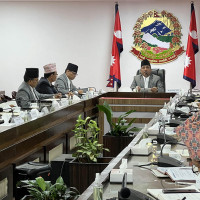
-(1)-original-thumb.jpg)
